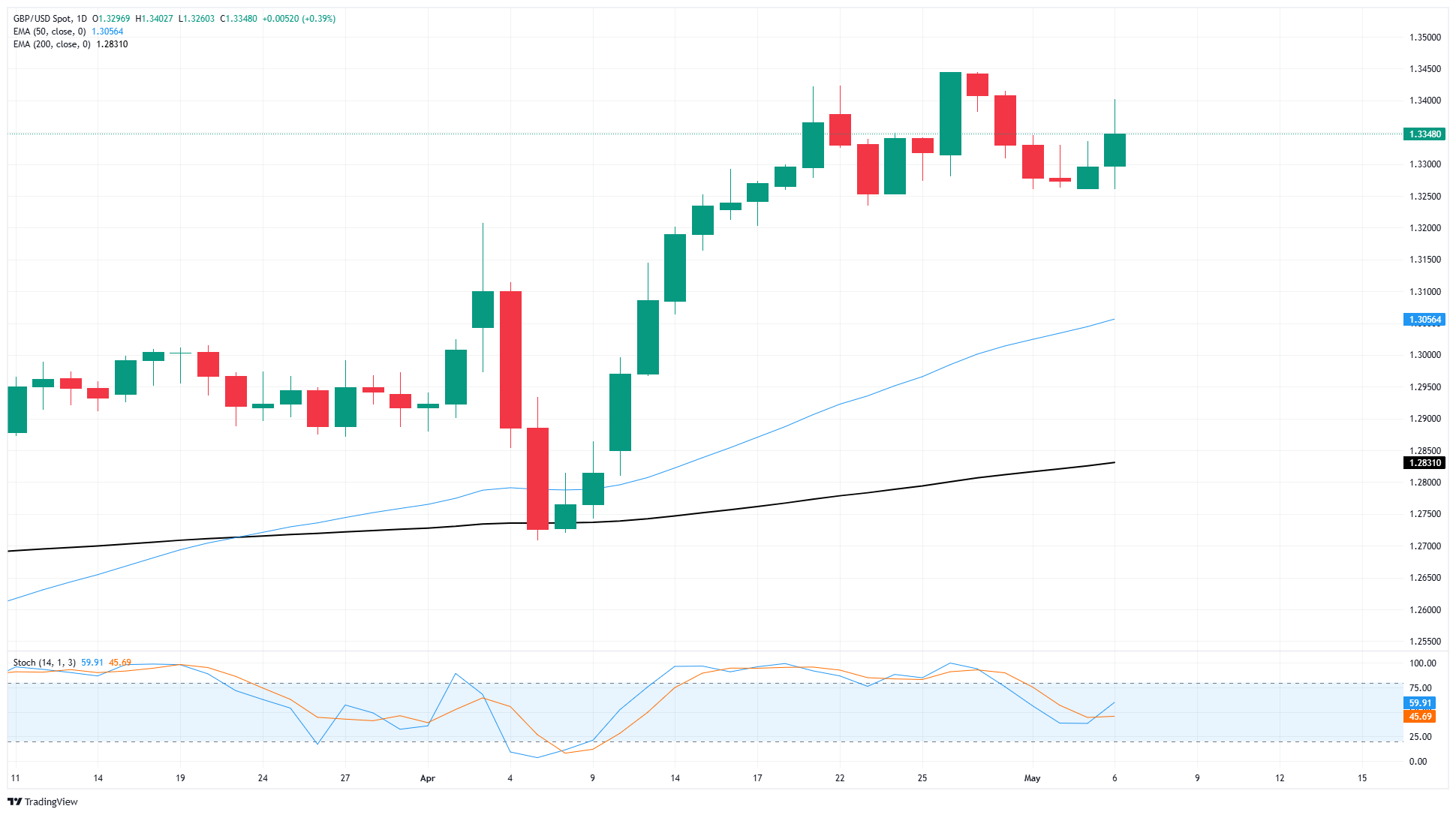Created
: 2025.05.07














![]() 2025.05.07 08:21
2025.05.07 08:21
GBP/USD rose on Tuesday, climbing four-tenths of one percent on the day and testing the 1.3400 handle on headlines of a possible US-UK trade deal that would see the UK avoid the brunt of trade tariffs being actively pursued by the Trump administration.
The Federal Reserve's (Fed) upcoming rate call due on Wednesday still hangs over markets as the key market event of the week. Despite markets broadly anticipating another hold on Fed rates, investors will be taking a close look at policymaker comments, specifically Fed Chair Jerome Powell's statement, for any signs that the Fed might be pivoting toward a rate-cutting cycle sooner rather than later.
The Fed has come under pressure on multiple fronts to drop interest rates recently: market participants are always on the hunt for cheaper financing options, and the Trump administration has been incredibly vocal and adamant that the Fed's job should be to lower interest rates in order to make US debt servicing cheaper. This runs largely opposite the Fed's dual mandates of supporting full employment and keeping price volatility in check, however these key aspects of the Fed's mandate are largely lost on US President Donald Trump.
The Bank of England (BoE) will be following up Wednesday's Fed action with its own rate call on Thursday. Unlike the Fed, the BoE is broadly expected to deliver another quarter-point rate trim, with the BoE's Monetary Policy Committee (MPC) expected to vote nine-to-one in favor of delivering its fourth rate cut since August of last year.
Despite a firm bullish performance on Tuesday, GBP/USD remains embroiled in a near-term consolidation range baked in between 1.3450 and 1.3250. Price action is leaning into the midrange, with technical oscillators showing momentum has largely drained out of Cable markets.
GBP/USD is still well supported far above the 200-day Exponential Moving Average (EMA) near 1.2830, however further topside momentum will take a strong showing from bidders that have remained trapped below the 1.3400 handle for the time being.

The Pound Sterling (GBP) is the oldest currency in the world (886 AD) and the official currency of the United Kingdom. It is the fourth most traded unit for foreign exchange (FX) in the world, accounting for 12% of all transactions, averaging $630 billion a day, according to 2022 data. Its key trading pairs are GBP/USD, also known as 'Cable', which accounts for 11% of FX, GBP/JPY, or the 'Dragon' as it is known by traders (3%), and EUR/GBP (2%). The Pound Sterling is issued by the Bank of England (BoE).
The single most important factor influencing the value of the Pound Sterling is monetary policy decided by the Bank of England. The BoE bases its decisions on whether it has achieved its primary goal of "price stability" - a steady inflation rate of around 2%. Its primary tool for achieving this is the adjustment of interest rates. When inflation is too high, the BoE will try to rein it in by raising interest rates, making it more expensive for people and businesses to access credit. This is generally positive for GBP, as higher interest rates make the UK a more attractive place for global investors to park their money. When inflation falls too low it is a sign economic growth is slowing. In this scenario, the BoE will consider lowering interest rates to cheapen credit so businesses will borrow more to invest in growth-generating projects.
Data releases gauge the health of the economy and can impact the value of the Pound Sterling. Indicators such as GDP, Manufacturing and Services PMIs, and employment can all influence the direction of the GBP. A strong economy is good for Sterling. Not only does it attract more foreign investment but it may encourage the BoE to put up interest rates, which will directly strengthen GBP. Otherwise, if economic data is weak, the Pound Sterling is likely to fall.
Another significant data release for the Pound Sterling is the Trade Balance. This indicator measures the difference between what a country earns from its exports and what it spends on imports over a given period. If a country produces highly sought-after exports, its currency will benefit purely from the extra demand created from foreign buyers seeking to purchase these goods. Therefore, a positive net Trade Balance strengthens a currency and vice versa for a negative balance.
![]()
Created
: 2025.05.07
![]()
Last updated
: 2025.05.07

FXStreet is a forex information website, delivering market analysis and news articles 24/7.
It features a number of articles contributed by well-known analysts, in addition to the ones by its editorial team.
Founded in 2000 by Francesc Riverola, a Spanish economist, it has grown to become a world-renowned information website.
We hope you find this article useful. Any comments or suggestions will be greatly appreciated.
We are also looking for writers with extensive experience in forex and crypto to join us.
please contact us at [email protected].
Disclaimer:
All information and content provided on this website is provided for informational purposes only and is not intended to solicit any investment. Although all efforts are made in order to ensure that the information is correct, no guarantee is provided for the accuracy of any content on this website. Any decision made shall be the responsibility of the investor and Myforex does not take any responsibility whatsoever regarding the use of any information provided herein.
The content provided on this website belongs to Myforex and, where stated, the relevant licensors. All rights are reserved by Myforex and the relevant licensors, and no content of this website, whether in full or in part, shall be copied or displayed elsewhere without the explicit written permission of the relevant copyright holder. If you wish to use any part of the content provided on this website, please ensure that you contact Myforex.
Myforex uses cookies to improve the convenience and functionality of this website. This website may include cookies not only by us but also by third parties (advertisers, log analysts, etc.) for the purpose of tracking the activities of users. Cookie policy